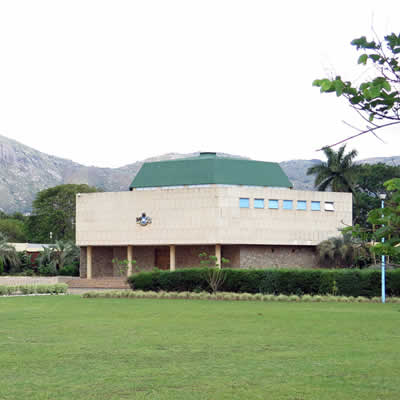
Eswatini became a constitutional monarchy at independence in September 1968 under King Sobhuza II and held its first post-independence elections in 1972. The country's dual system of governance - the parliamentary and the traditional system is described as monarchial democracy - the marriage between the monarchy and the ballot box. These two systems have deeply shaped the present pattern of national political processes, including electoral laws and development policies as well as the country's Constitution, Act No.001/2005 which came into force on 26 July 2005.
The Constitution is the supreme law of the land. According to section 79, the basis of the country's political system is the Tinkhundla, the traditional geographical and administrative unit. At the apex of this political order is the Monarchy, an institution which has deep roots in the history, culture and traditions of the Swazi people. The King is vested with the roles of Ceremonial and Executive Head of State.
The Constitution also provides for three independent organs or arms of government - the Executive, the Judiciary and a bicameral Legislature. The latter has been in existence 1967 Section 106 of the Constitution vests the supreme legislative authority of Eswatini in the "the King-in-Parliament" where the King and Parliament may make laws for the peace, order and good government of Eswatini.
The bicameral Legislature consists of a Senate and a House of Assembly. The Senate shall consist of not more than thirty one (31) Members (Senators) who shall be elected or appointed. The Constitution provides the King with the authority to appoint two-thirds of this Chamber. The House of Assembly shall consist of not more than seventy six (76) Members (MPs); with not more than sixty (60) directly elected and the rest nominated by the King. The King also appoints the Prime Minister from among the members of the House of Assembly (Section 67 (1) of constitution).
Members (MPs) elected to the House of Assembly are elected from Tinkhundla, which also serve as constituencies for the purposes of electing Members of Parliament. Following the September 20th, 2013 elections, the House of Assembly has a total of sixty five (65) Members, of which fifty-five (55) were elected through a popular vote from the Tinkhundla and ten (10) appointed by the King. The Senate currently has thirty (30) Members (Senators). Twenty (20) of the Senators were appointed by the King and ten (10) by the House of Assembly.
The President of Senate, assisted by the Deputy President, presides over the Senate while the House of Assembly is presided over by The Speaker, assisted by the Deputy Speaker.
Parliament is therefore accountable to the people when performing the powers and responsibilities entrusted by the Constitution and any Act of Parliament. It is mandated to strengthen democracy and good governance through its key functions which are:
The responsibilities of Parliament are performed through the plenary and the committee meetings which are regulated by the Constitution Privileges act, Parliament's Standing Orders. There are currently twenty one (21) Government Portfolio Committees and twenty (20) Assembly Sessional Committees, each of which has the power and functions as assigned to it by the Standing Orders.
Article 131 of the Constitution also provides for a Parliamentary Service which shall form part of the public service of Eswatini. The Parliamentary Service is administered by a Parliamentary Service Board consisting of the President and Speaker, four other members, two of whom shall be Members of Parliament. The Clerk to Parliament serves as the Secretary and an ex officio member. The Board is charged with proper and effective administration of parliament - it may make regulations, prescribe terms and conditions of service of the parliamentary service staff with the approval of the Joint House Committee and do anything necessary for the efficient administration of the parliamentary service.
The Clerk of Parliament is the Controlling Officer of Parliament and Secretary to the Parliamentary Service Board. The appointment of the Clerk and any other member of the staff of the parliamentary service are made by the Board in consultation with the Civil Service Commission. No member of staff of the Parliamentary service is suspended, transferred, promoted or dismissed without the approval of the Parliamentary Service Board.
Among other duties, the Clerk to Parliament is responsible for policy implementation, monitoring and evaluation and provision of overall policy guidance for the day-to-day running of the National Assembly. In order for the Clerk to Parliament to fully discharge the mandate and ensure that the Parliament enhances its efficiency and effectiveness in service delivery, there is need for a well established and integrated structure with a well trained, motivated and committed workforce. Overall, Parliament can function effectively and efficiently if it has a proper and capacitated institutional structure and systems in place to support the core mandate of the Parliament. It also needs an improved legislative process, an improved and properly functioning oversight service and effective leadership and representational role of MPs in their constituencies. All this calls for the availability of skills, knowledge, proper conduct of business by both secretariat staff on the one hand, and Parliamentary Service Board and MPs on the other.